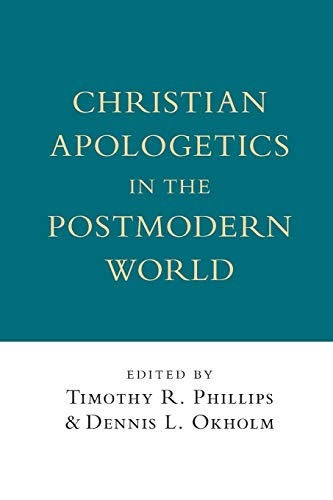
Inhaltsangabe
A group of evangelicalism’s most stimulating thinkers consider possible apologetic responses to the challenges of postmodernity. Edited by Timothy R. Phillips and Dennis L. Okholm.
Die Inhaltsangabe kann sich auf eine andere Ausgabe dieses Titels beziehen.
Über die Autorin bzw. den Autor
Okholm (Ph.D., Princeton Theological Seminary) teaches in the department of theology and philosophy at Haggard School of Theology, Azusa Pacific University. Previously he was associate professor of theology at Wheaton College in Wheaton, Illinois. He is also an ordained minister in the Presbyterian Church (USA), and an oblate of a Benedictine monastery (Blue Cloud Abbey, SD). He has coauthored and coedited several books, including two collections of papers presented at the annual Wheaton Theology Conference and Welcome to the Family: An Introduction to Evangelical Christianity (all in partnership with Timothy R. Phillips).
Von der hinteren Coverseite
Evangelicals are beginning to provide analyses of our postmodern society, but little has been done to suggest an effective apologetic strategy for reaching a culture that is pluralistic, consumer-oriented, and infatuated with managerial and therapeutic approaches to life. This, then, is the first book to address that vital task. In these pages, some of evangelicalism's most stimulating thinkers consider three possible apologetic responses to postmodernity. William Lane Craig argues that traditional evidentialist apologetics remains viable and preferable. Roger Lundin, Nicola Creegan and James Sire find the postmodern critique of Christianity and Western culture more challenging, but reject central features of it. Philip Kenneson, Brian Walsh and J. Richard Middleton, on the other hand, argue that key aspects of postmodernity can be appropriated to defend orthodox Chnstianity. An essential feature is trenchant chapters by Douglas Webster, Ron Potter and Dennis Hollinger considering issues facing the local church in the light of postmodernity. The volume's editors and John Stackhouse add important introductory essays that orient the reader to postmodernity and various apologetic strategies. All this makes for a book indispensable for theologians, a wide range of students and reflective pastors.
„Über diesen Titel“ kann sich auf eine andere Ausgabe dieses Titels beziehen.
Suchergebnisse für Christian Apologetics in the Postmodern World (Wheaton...
Christian Apologetics in the Postmodern World (Wheaton Theology Conference)
Anbieter: Wonder Book, Frederick, MD, USA
Zustand: Very Good. Very Good condition. A copy that may have a few cosmetic defects. May also contain light spine creasing or a few markings such as an owner's name, short gifter's inscription or light stamp. Bundled media such as CDs, DVDs, floppy disks or access codes may not be included. Artikel-Nr. P04K-00737
Christian Apologetics in the Postmodern World (Wheaton Theology Conference Series)
Anbieter: BooksRun, Philadelphia, PA, USA
Paperback. Zustand: Very Good. Special Edition. It's a well-cared-for item that has seen limited use. The item may show minor signs of wear. All the text is legible, with all pages included. It may have slight markings and/or highlighting. Artikel-Nr. 083081860X-8-1
Christian Apologetics in the Postmodern World
Anbieter: ThriftBooks-Reno, Reno, NV, USA
Paperback. Zustand: Very Good. No Jacket. May have limited writing in cover pages. Pages are unmarked. ~ ThriftBooks: Read More, Spend Less. Artikel-Nr. G083081860XI4N00
Christian Apologetics in the Postmodern World
Anbieter: ThriftBooks-Atlanta, AUSTELL, GA, USA
Paperback. Zustand: Very Good. No Jacket. May have limited writing in cover pages. Pages are unmarked. ~ ThriftBooks: Read More, Spend Less. Artikel-Nr. G083081860XI4N00
Christian Apologetics in the Postmodern World
Anbieter: ThriftBooks-Dallas, Dallas, TX, USA
Paperback. Zustand: Very Good. No Jacket. May have limited writing in cover pages. Pages are unmarked. ~ ThriftBooks: Read More, Spend Less. Artikel-Nr. G083081860XI4N00
Christian Apologetics in the Postmodern World
Anbieter: ThriftBooks-Atlanta, AUSTELL, GA, USA
Paperback. Zustand: Good. No Jacket. Former library book; Pages can have notes/highlighting. Spine may show signs of wear. ~ ThriftBooks: Read More, Spend Less. Artikel-Nr. G083081860XI3N10
Christian Apologetics in the Postmodern World
Anbieter: ThriftBooks-Phoenix, Phoenix, AZ, USA
Paperback. Zustand: Very Good. No Jacket. May have limited writing in cover pages. Pages are unmarked. ~ ThriftBooks: Read More, Spend Less. Artikel-Nr. G083081860XI4N00
Christian Apologetics in the Postmodern World
Anbieter: Better World Books: West, Reno, NV, USA
Zustand: Good. Used book that is in clean, average condition without any missing pages. Artikel-Nr. 1031317-6
Christian Apologetics in the Postmodern World
Anbieter: Better World Books, Mishawaka, IN, USA
Zustand: Very Good. Used book that is in excellent condition. May show signs of wear or have minor defects. Artikel-Nr. 4622904-6
Christian Apologetics in the Postmodern World
Anbieter: Better World Books, Mishawaka, IN, USA
Zustand: Good. Former library book; may include library markings. Used book that is in clean, average condition without any missing pages. Artikel-Nr. GRP81478360
